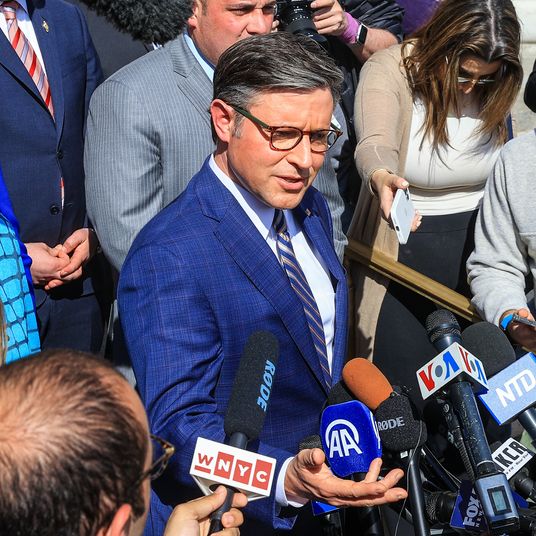
Overnight Saturday, Iran conducted an unprecedented direct attack on Israel, launching a barrage of drones and cruise and ballistic missiles at Israeli military targets. Israel says it and its allies, including the U.S., almost entirely intercepted the air assault, and that the strikes caused only minor damage to one Israeli military base. So far, there’s been one reported injury, a 7-year-old Bedouin girl struck by shrapnel from one of the interceptions.
The attack was in retaliation for Israel’s April 1 air strike on Iran’s Consulate in Syria, which killed two Iranian generals and five other military officers. Iran’s government has signaled that it now views the matter “concluded,” but it’s not yet clear if, how, or when Israel will respond. The White House has reiterated that U.S. support for Israel remains “ironclad,” while President Joe Biden has reportedly told Prime Minister Benjamin Netanyahu the U.S. will not support a retaliation on Iran. Meanwhile, there’s no question that the dramatic escalation in violence between the two countries risks triggering a wider and potentially destabilizing regional war, far beyond the ramifications of what’s already happening in Gaza. Below is a running look at how various analysts, experts, and other commentators are responding to the news and what they’re saying about what might or should happen next.
The failed attack may have given Biden more leverage
Dexter Filkins makes that case at The New Yorker:
In the days after October 7th, Biden gained significant credibility among Israelis for his quick and forceful response. Still, his relationship with Netanyahu has deteriorated markedly in recent weeks; Gazan authorities now put the death toll at thirty-three thousand and climbing, and in early April seven aid workers with World Central Kitchen, the humanitarian-assistance group, were killed in an Israeli air strike in Gaza — an action that the I.D.F. insists was a mistake. As the Netanyahu government has failed to delineate a clear end point for the war or a political vision for Gaza’s future, American public opinion has begun to shift against Israel …
After the death of the aid workers, Biden used the moment to force changes on Netanyahu. Among other things, the Israeli government agreed to reopen Erez, one of the country’s main gateways into Gaza, potentially allowing humanitarian assistance to flow more freely. The I.D.F.’s stunning performance against the Iranian attack could provide Biden with another opening to reshape Netanyahu’s calculations. In the coming days, Biden will likely press to forestall plans for a direct assault on Rafah, a city in Gaza that serves as Hamas’s last stronghold. Rafah has become a haven for more than a million Palestinian civilians, who would bear the brunt of the violence, providing Iran and its allies with enormous propaganda opportunities. No leader yearns more for a region-wide bloodbath than [Hamas military commander Yahya] Sinwar; from the beginning, he has hoped to lure Israel into a quagmire, just as the United States was provoked to overstep after the attacks of September 11, 2001. If Biden ever seemed likely to exert maximum pressure on Netanyahu to restrain himself, now is the time.
The lone victim
The New York Times reports that the community where a young girl was seriously injured when she was struck by a missile fragment is unrecognized by the Israeli government, and thus without much protection:
While Israel suffered little in the way of significant damage overnight, this one family was dealt a devastating blow. Amina al-Hasoni, 7, was clinging to life — the sole serious casualty of the Iranian barrage. And were it not for systemic inequities in Israel, her relatives said, maybe she too could have been spared.
There are roughly 300,000 Arab Bedouins in the Negev desert.
About a quarter of them live in villages that are not recognized by Israeli officials. Without state recognition, those communities have long suffered from a lack of planning and basic services like running water, sewers and electricity. And few have access to bomb shelters, despite repeated requests to the state.
The Hasoni family lives in one such community, sharing a hilltop in the Negev village of al-Fur’ah with a plot of disconnected houses. When rocket warning sirens went off on Saturday night, Amina’s uncle Ismail said he felt stuck — there was nowhere to go.
Will Netanyahu squander Israel’s victory?
The Atlantic’s Graeme Wood writes from Tel Aviv:
The attack is also a gift to the hapless Benjamin Netanyahu, Israel’s prime minister, whose incompetence was universally acknowledged just a day ago. Now, after botching the response to the worst terrorist attack in Israel’s history, Netanyahu’s government gathers credit for having repelled the most significant Iranian attack in Israel’s history. This morning, one could argue that Israel is safer than it has been since before October 7. “I think there are strategic opportunities,” the IDF spokesperson said in his briefing, and “we should look for those opportunities.” Netanyahu does not even have to launch a counterattack. Joe Biden has advised him that the U.S. will not support one, which relieves Netanyahu of the obligation. European countries that have criticized Israel over Gaza have stopped to condemn Iran instead.
But just because Netanyahu could decide to do nothing precipitous doesn’t mean that he will. He and his cabinet are constantly in search of new and ingenious ways to squander an opportunity. So today in the Middle East everyone is trying to imagine how they will misspend the credit Iran has just extended them. If Netanyahu behaves uncharacteristically, he could reach out to Israel’s Arab allies, and to its international critics, and try to reboot Gaza negotiations and bring home the Israeli hostages who are still alive. With Gaza at least partially in rubble and in famine conditions, and with essentially zero progress in negotiation with Hamas, some jolt to the status quo is necessary. Hamas has shown little interest in achieving a viable deal, and now its position has weakened slightly, because Iran seems so obviously disinclined to intervene in its favor by regionalizing the war. This reminder that Israel’s enemies are not limited to Hamas, and that Israel owes debts to its Arab friends who wish to see Gazans return to their homes (and who not-so-secretly also wish Israel could somehow eliminate Hamas without fuss once and for all), could catalyze a new Israeli reaction to the conflict.
Israel’s options
On his Substack, CSIS and Lowy Institute fellow Mick Ryan notes four potential ways Israel may choose to respond to the attack:
Option 1: Israel may elect to not directly respond to Iran’s attack. This would possibly de-escalate the situation but risks setting a new normal in the Middle East strategic environment where Iran can attack Israel up to a certain threshold without major retaliation. Israel not retaliating would probably please many Middle East governments (at least openly), although they also now have to ponder if Iran — willing to take on Israel directly — might not be willing to attack them directly as well.
Option 2: Israel responds with a proportionate attack against Iranian military targets in Iran. Israel has rehearsed attacks against Iran in the past, and probably has the capacity to do so at short notice. It is certain to be one of the strategic options that the Israeli cabinet is now considering. This would be accompanied by cyber attacks, information warfare, and possibly other Israeli acts of sabotage against the Iranian regime.
Option 3: A proportionate regional response. This is a variation of Option 2 where Israel conducts a series of attacks against Iranian targets across the region but not within Iran itself. This is probably going to be a feature in any Israeli response.
Option 4: Israel might decide that a massive hammer blow against Iran is needed to reestablish deterrence (if indeed that is possible any longer). Could Israel use this as a casus belli to attack Iran’s nuclear weapon programs directly as well as a range of military and political targets in Iran? This would be a significant escalation of the Iran-Israel conflict.
Why did Iran decide to strike back?
Because they concluded they had to, a pair of analysts tell the New York Times:
“Iran’s government appears to have concluded that the Damascus strike was a strategic inflection point, where failure to retaliate would carry more downsides than benefits,” said Ali Vaez, the Iran director of the International Crisis Group, in an interview. “But in doing so, the shadow war it has been waging with Israel for years now threatens to turn into a very real and very damaging conflict,” one that could drag in the United States, he added.
“The Iranians have for now played their card,” said Sanam Vakil, director of the Middle East and North Africa program at Chatham House. “They made a choice to call Israel’s bluff, and they felt they needed to do so, because they see the last six months as a persistent effort to set them back across the region.”
At Foreign Policy, Daniel Byman and Kenneth M. Pollack note the ways Iran pulled its punch:
Iran is well aware of the extent and capability of Israel’s air defenses. The scale of the strike was almost certainly designed to enable at least some of the attacking munitions to penetrate those defenses and cause some degree of damage. Their inability to do so was doubtless a disappointment to Tehran, but the Iranians can probably still console themselves that the attack was frightening for the Israeli people and alarming to their government. Iran probably hopes that it was unpleasant enough to give Israeli leaders pause the next time they consider an operation like the embassy strike.
Nevertheless, while 300 or more attacking munitions certainly sounds like a lot, it also shows signs of restraint that signal Tehran’s own concerns about further escalation. First, Iran could have launched considerably more — not orders of magnitude more but probably at least double what it did without badly depleting stockpiles of its longest-range assets. Second, initial reporting indicates that the attack reportedly focused on one or more military targets, including an Israeli air force base outside Beersheba. That, too, suggests an important degree of caution on Iran’s part. It could have launched at Tel Aviv or Haifa, where any impact would have been far more likely to kill Israeli civilians.
The collective air defense against the attack could be an opportunity for greater regional unity
Writes Times of Israel political correspondent Tal Schneider:
Israel needs to take an unflinching look at the new regional reality. The regional alliance between the U.S., Israel, and allied Arab countries, known as Middle East Air Defense (MEAD), is already in play. Without this assistance, especially from the U.S., Israel would look completely different this morning.
Haaretz reporter and Netanyahu biographer Anshel Pfeffer made this point in an X thread:
We may not know for a while the full details of the Arab cooperation tonight in the interception of the Iranian drone and missile attack on Israel, but it was significant without a doubt, including the use of Jordan’s airspace. It certainly helped to save many Israeli lives.
The cooperation between Israel and Arab nations in intercepting the Iranian drones and missiles could be an opportunity for a new regional framework which would help achieve a cease-fire in Gaza, but sadly Netanyahu’s far-right government will squander this opportunity.
This is what everyone warned might happen
Longtime Iran analyst Barbara Slavin writes in a Haaretz op-ed that the new crisis “demonstrates the validity of concerns that the failure to achieve a swift cease-fire in Gaza would lead to a wider conflict between Israel and Iran”:
The war didn’t start on Oct. 7, 2023, but Israel’s disproportionate response to the unprecedented Hamas attacks and the massive number of Palestinian civilian deaths have outraged international opinion and alienated many Americans including long-time Israel supporters.
In this situation, Iran might have been better advised to let Netanyahu continue to dig a bigger hole for himself and his right-wing policies rather than changing the subject and making Israel the perceived victim of new Iranian aggression. But that bridge has now been crossed and a region that has seen too many wars and crises is unlikely to find a stable equilibrium anytime soon. The losers will be ordinary Israelis, Palestinians, Iranians, and all others who seek a normal life.
Israel’s new bind
The Economist emphasizes that while Iran may have miscalculated in how it carried out the attack, it still leaves Israel in a rough spot, particularly regarding the risks of any direct response:
If the Iranian attack had been deadlier, it would have made a reprisal inevitable; if it had been smaller, Israel could have shrugged it off. The precedent set is not entirely reassuring. While Israel’s air defences performed well, they had weeks to prepare and help from at least three other countries. They may be put under greater pressure under less favourable circumstances. On April 14th Iran appeared to suggest a new strategic doctrine, of acting directly rather than through proxies. “From now on, if the Zionist regime attacks our interests, assets, people or citizens at any point we will counter attack from the Islamic Republic of Iran,” Hossein Salami, the head of the Islamic Revolutionary Guard Corps, told Iranian TV. It is doubtful that Iran could make such barrages a regular event but the intent is alarming.
As the attack unfolded, Israel sent mixed messages about how it might retaliate. An unnamed senior official told Israel’s Channel 12 that an “unprecedented response” was coming and that Israelis should stay awake through the night to watch it (they would have been disappointed: nothing happened). Other sources were less brash, saying that the response would depend on the extent of the damage. Israel has no easy options. It could retaliate in kind, launching its own drones and missiles against army bases or nuclear sites in Iran. But that carries a real risk that Iran will strike back a second time, and harder. It would also alarm Israel’s allies who are no friends of Iran but fear a regional war.
Biden pressured Israel not to strike back. Will it work?
As Iran’s attack commenced, the IDF said it had planes in the air ready to respond. Axios and others report that while the U.S. has publicly affirmed its steadfast support for Israel and assisted with shooting down Iran’s drones and missiles, Biden also informed Netanyahu that the U.S. would not support an Israeli counterattack on Iran:
Biden told Netanyahu the joint defensive efforts by Israel, the U.S., and other countries in the region led to the failure of the Iranian attack, according to the White House official.
“You got a win. Take the win,” Biden told Netanyahu, according to the official. The official said that when Biden told Netanyahu that the U.S. will not participate in any offensive operations against Iran and will not support such operations, Netanyahu said he understood.
Suzanne DiMaggio, a senior fellow at the Carnegie Endowment for International Peace, says that back-channel U.S. de-escalation efforts appear to have paid off:
Official and unofficial U.S.–Iran back-channel diplomacy since the Damascus strike on April 1 helped to prevent this crisis from spiraling out of control. Consistent messaging across multiple channels clarified each side’s thinking, spelling out intentions and redlines.
Early on, the U.S. made clear that it was not involved in the strike. Iran informed the U.S. that retaliatory measures were inevitable, relaying the nature and scope of the response over time.
While urging restraint, a clear redline for the U.S. was no targeting of U.S. forces or facilities. For Iran, a redline was no direct U.S. involvement in any response by Israel. Biden telling Netanyahu the U.S. will not participate in any offensive operations against Iran is notable.
The attack was also a data point
Bloomberg reports that Iran’s large-scale attack may have yielded valuable data on Israel’s air defenses:
Iran will likely carefully monitor the Israeli and U.S. response to see how its technology competes with western air systems and tactics, according to a former U.S. intelligence official, who asked not to be identified given the sensitivity of the issue. Iran could use those insights for future attacks, as well as share it with proxies to improve their effectiveness with Iranian weapons.
According to the Institute for the Study of War’s analysis, the attack “shows that Iran is learning from the Russians and the Houthis to develop increasingly dangerous and effective strike packages against Israel and the U.S.”:
The combination of Iranian drones and both cruise and ballistic missiles against Israel is meant to confuse and overwhelm Israeli air defenses. Launches of concurrent attacks by Iranian-backed actors in Lebanon and Yemen are part of this effort.
This Iranian approach mirrors Russia’s experimentation with combinations of ballistic and cruise missiles alongside Iranian drones to launch increasingly effective strike packages able to penetrate U.S. and European anti-missile and air-defense systems.
Iran has also learned from Houthi attacks targeting international shipping around Yemen. The Houthis have used combinations of Iranian drones and missiles against U.S. air- and missile-defense systems, allowing Iran and the Houthis to test and improve their strike packages.
The continued use of Iranian-designed drones by multiple enemies of the U.S. and the deepening ties between the actors using them will help Tehran, Russia, North Korea, and China to refine their use of these systems against the United States and its allies and partners. The U.S. and its allies and partners face an increasingly interconnected group of adversaries helping one another and learning from one another.
Can Israel risk going to war with Iran?
At TPM, Josh Marshall notes that Israel’s military is not really built to fight such a conflict:
The U.S. will of course be applying a huge amount of pressure on Israel to de-escalate the situation. But there are other considerations for Israel. Deterrence is critical for Israel. So just on the level of basic IDF doctrine, it’s very difficult for Israel not to respond to this. But there are other considerations that don’t get enough attention. The IDF is a military designed for short wars in which it moves rapidly to move the conflict off its territory. The country has no strategic depth (no territory to fall back on), and it has a mass reserve mobilization military. So moving immediately on to the offensive to win decisive battles off its own territory is critical.
But the IDF has already been fighting for seven months. It’s lost a lot of readiness through that. Part of the short-war thing is that it relies on mass mobilization, which it can’t do for that long. So Israel has its own very big risks letting this evolve into a broader regional conflict. Meanwhile, Hezbollah over the Lebanese border has basically kept its powerful offensive capacity in reserve.
Israel is taking advantage of U.S. support
Via the Atlantic Council, Daniel E. Mouton points out that this whole mess was made possible by the temporary surge of U.S. troops to the region after the October 7 Hamas attack — noting that Israel views those forces as an insurance policy:
Regardless of the relative success of the Iranian attack, there are no guarantees that there won’t be another escalatory cycle. Senior officials at the Pentagon have repeatedly made it clear that they want to pull U.S. forces from the Middle East and recommit them to the Indo-Pacific and Europe theaters. Israel knows of this dynamic. Israel feels it must act while it enjoys a strong U.S. force presence. Thus, today’s attack will not be the end.
Other than the continued threat of Iran, the second-biggest unresolved issue is lack of transparency. Israeli leaders did not notify the United States of their early-April strike on the Iranian diplomatic facility. U.S. forces are deployed to the region as an insurance policy for Israel while it conducts its campaign in Gaza. There is a real need for Israel to share its plans, while U.S. leaders must also acknowledge the need to have a serious conversation about maintaining a sufficient presence in the region to aid in the deterrence of Iran.
‘Zero adults in the room’
That was the response on X from Jasmine M. El-Gamal, a former Middle East adviser to the Pentagon during the Obama administration, as the attack was still underway:
Netanyahu acted incredibly recklessly [on April 1], and Iran took the bait. Zero adults in the room and the entire region now at risk.
There are no guarantees in these kinds of scenarios. The Iranians may full well have launched their attack believing Israel, U.S. & allies will intercept 100%. But all it takes is one slip up, one casualty, for all bets to be off.
The danger of this moment can’t be overstated.
Did Israel and the U.S. underestimate Iran’s will to respond?
Abdolrasool Divsallar, a Middle East scholar and senior researcher at the U.N. Institute for Disarmament Research, called the attack the result of a “collective failure”:
Tonight marks the collective failure of Israeli and U.S. understanding of Iran’s strategic thinking. An overconfidence about knowing Iran and that Iran won’t respond directly led to a strategic mistake of attacking Iranian Consulate and escalations of tonight.
He later added:
The only remaining way now to de-escalate and prevent a full-scale war in the Middle East is to convince Israel to refrain from response and avoid hitting back Iran. U.S., U.K., and E.U. could have a major role in conflict management NOW, instead of side-taking.
Iran hawks are calling for major strikes on Iran
A representative sample:
And from former national security adviser and Iraq War architect John Bolton to CNN:
Israel’s response to the Iranian attack should not be proportionate, but it should be far stronger because when deterrence fails to reestablish it, you have to teach the adversary that any gain they may make in any future attack will be more than outweighed by the damage.
Republicans, meanwhile, quickly targeted President Biden
Donald Trump claimed that such an attack would have never happened if he were president, even though the last major attack Iran launched happened when he was president. While Iran’s drones and missiles were still on the way to Israel, Republican lawmakers offered a chorus of criticism toward Biden:
What did Iran say about the possibility of further strikes?
Iran’s mission to the United Nations released a statement while the attack was underway that essentially said this was the one retaliation for the Israeli attack on the Iranian Consulate in Syria, but any further attacks on Iran would prompt a “considerably more severe” response.
The message was similar to the one Iran sent in 2020 after it conducted a ballistic missile strike on an Iraqi base housing U.S. troops in retaliation over the Trump administration’s assassination of Qasem Soleimani, the head of the Islamic Revolutionary Guard Corps-Quds Force.






























